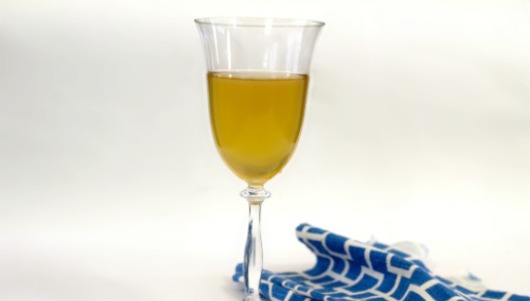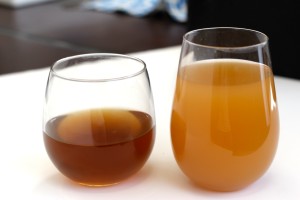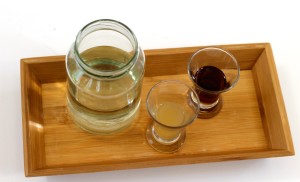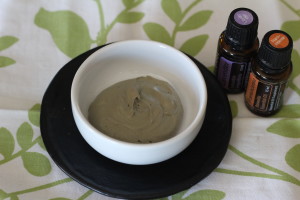Ingredient Spotlight: Apple Cider Vinegar
Apple Cider Vinegar is pretty much what it sounds like. Vinegar made from apples. The freshly pressed juice is put through a long fermentation process during which time an accumulation of yeast and acetic acid bacteria builds up and appears as a cloudy web-like mass, known as the ‘mother’, which you’ll see settled on the bottom of the bottle.
The use of vinegar dates back to around 5000 BC, first being used as a food preservative, then later in medicinal remedies. Today vinegar is used in a variety of ways including cooking, cleaning, gardening and hygiene applications.
Most vinegars are pasteurized and filtered which prevents the ‘mother’, an incredibly beneficial bacteria, from forming. Unprocessed and unfiltered Apple Cider Vinegar therefore has health benefits its ‘clear’ counterparts don’t have. Make sure when you buy Apple Cider Vinegar to get an Organic version that is murky and retains the ‘mother’.
People use this vinegar (called ‘ACV’ by its fans) in a variety of ways including soothing an upset stomach, healing a sore throat, as a remedy for sinus congestions, as a weight loss aid, in beauty regimens and for numerous other health benefits. You can find ACV in most any store. Bragg’s is a well respected brand. The basic recipe is 1 Tablespoon mixed into 8-10 ounces of water or clear juice. Make sure you dilute it with something though, because of vinegars high acidity, it could burn the sensitive tissues in your throat or damage the enamel on your teeth.
Here are a few of the most common remedies using ACV:
Weight-Loss Aid
Many people swear by the benefits of consuming ACV for weight loss, claiming that it increases satiety, thereby reducing the total food consumed over the course of the day. Besides suppressing your appetite, acetic acid is also purported to increase metabolism and reduce water retention as well as disrupting the body’s digestion of starch, which could mean less calories entering the bloodstream.
I like to dilute 1 Tablespoons of ACV and 1 Tablespoon of maple syrup with 8 ounces of either flat or sparkling water. No joke… I actually really like this drink! Even my 8 year old daughter gave me the ‘not bad’ seal of approval! You’ve got to try it. And if it can help shave a few pounds off in the process, I’m all in!
Upset Stomach/GI Distress/Acid Reflux
ACV is anti-bacterial, so if whatever is making your tummy unhappy is caused by a bacterial infection, ACV may be able to combat it.
Acid reflux is actually the result of too little acid in your stomach. Taking 1 Tablespoon of ACV in a large glass of water daily can easily help to correct the imbalance. The pectin is also credited with soothing intestinal spasms.
And even if you feel fine now, but you are planning on eating things that you feel might be an issue, take a shot of 1 teaspoon of ACV mixed with 1 teaspoon maple syrup and 4 ounces (1/2 cup) of water 30 minutes before eating. It will help to maintain the pH balance in your stomach.
Sore Throat Remedy
Because of its antibacterial properties, ACV is ideal for fighting a sore throat. The acidity creates an environment in which germs are unable to survive. Just gargle with equal parts ACV and warm water.
Stuffy Nose and Sinus Pain Relief
Along with its antibacterial properties which can fight any infections present, ACV is high in potassium which thins mucous in the body.
Dandruff Remedy and Hair Rinse
The acidity of the ACV can help with treating dandruff, by changing the pH of your scalp and discouraging yeast growth. Spray soak the scalp with about 1/4 cup of ACV to water, wrap your head in a towel and let sit for 15 minutes to an hour, then wash. Proponents recommend this treatment twice a week.
Skin Toner and Soother
ACV can be a great natural toner. It can reduce inflammation and kill bacteria on the skin. Malic and lactic acids in the ACV also soften and exfoliate, and balance the pH of your skin.
It can also work great to sooth itchy insect bites. Just pour a bit a cotton ball and apply to dab it right on the bite.
One of my favorite beauty uses is to mix it with Bentonite Clay and use it as a facial mask, which detoxifies and tightens pores. Sometimes I will add a drop or two of essential oils like Frankincense or Lavendar which are both soothing to the skin. I apply the mud and leave it on for about 20 minutes, or until its dry…
….and you can’t move your face.
Blood Sugar Regulator
Many believe that ACV’s beneficial effect on blood sugar levels is the result of the acidic acid in vinegar. It is thought that it may prevent the complete digestions of complex carbohydrates and their breakdown into sugars, effectively creating a slower release of sugar into the bloodstream.
Cooking and Baking
There are also a bunch of ways you can use ACV in your cooking. When it reacts with baking soda it creates an extra lift in your baking. Especially helpful in vegan recipes. It can also be used as you would any other vinegar in sauces, dressings, soups and marinades.
An easy salad dressing can be made by combining 1 Tablespoon of Dijon mustard, 1 Tablespoon Apple Cider Vinegar, 1 pressed clove of garlic, freshly cracked black pepper and a pinch of salt in a small bowl. Then, whisking continuously, drizzle in 1/2 cup of olive oil whisking until emulsified.
Recipes with Apple Cider Vinegar









I actually didn’t know you were supposed to dilute ACV. Thanks for that tip! Very interesting article.
Yeah, the whole diluting thing makes sense if you think about it.